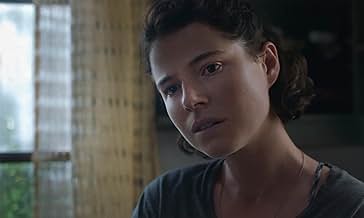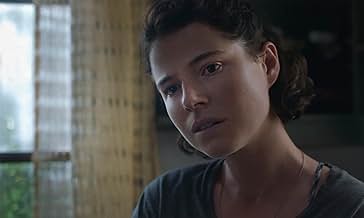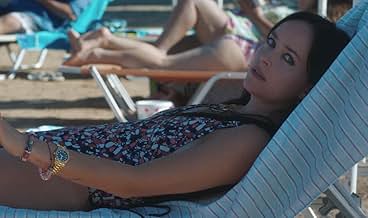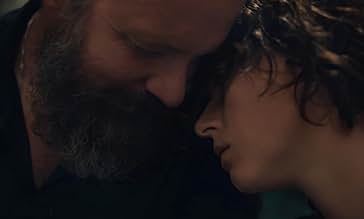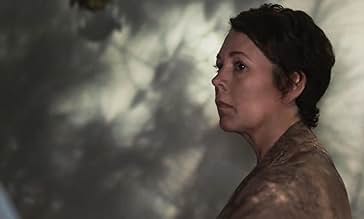Las vacaciones en la playa de una mujer dan un giro oscuro cuando empieza a enfrentarse a los problemas de su pasado.Las vacaciones en la playa de una mujer dan un giro oscuro cuando empieza a enfrentarse a los problemas de su pasado.Las vacaciones en la playa de una mujer dan un giro oscuro cuando empieza a enfrentarse a los problemas de su pasado.
- Dirección
- Guionistas
- Elenco
- Nominado a 3 premios Óscar
- 41 premios ganados y 114 nominaciones en total
Ellie Mae Blake
- Martha
- (as Ellie Blake)
Athena Martin Anderson
- Elena
- (as Athena Martin)
- Dirección
- Guionistas
- Todo el elenco y el equipo
- Producción, taquilla y más en IMDbPro
Opiniones destacadas
Greetings again from the darkness. There are so many things that go unspoken about parenting, and first time writer-director Maggie Gyllenhaal specifically focuses her lens on the pressures of motherhood, by adapting the 2006 novel from the anonymous and talented and mysterious Italian writer Elena Ferrante. Of course, we are all aware of Ms. Gyllenhaal's fine work as an actor, yet it's almost beyond belief that this is her debut as a feature film director. The source material is strong, but Ms. Gyllenhaal, along with a terrific performance from Olivia Colman (Oscar winner, THE FAVOURITE, 2018), turn a coastline vacation into a mesmerizing psychological case study.
Ms. Colman proves yet again what a fine and versatile actor she is. Here she plays Leda, a divorced professor on solo holiday on a picturesque Greek island, staying in a refurbished lighthouse tended by longtime caretaker Lyle (Ed Harris). Leda is packing a satchel full of books and academia work, and is a bit perturbed when her isolated beach time is suddenly interrupted by a large and noisy family of vacationers from Queens. Being an observant loner, Leda eyes young mother Nina (Dakota Johnson) who is struggling with her daughter, as well as her husband and other family members. This triggers memories in Leda that are handled via flashbacks with a terrific Jessie Buckley (I'M THINKING OF ENDING THINGS, 2020) as young Leda, stressed out wife and mother to two daughters. She longs for her own space.
At face value, this appears to be a movie about a woman annoyed that she can't just enjoy a quiet holiday on the sandy beach as she reads her books. However, there are so many layers to the story and to Leda, that as viewers, we must remain on high alert to pick up all the queues and subtleties. Watching Nina with her daughter and husband sends Leda deep into her past ... a past that still haunts her to this day. At the same time, while gazing at Leda, Nina can't help but wonder if she is looking at her own future self.
Much of what we see (past and present) reinforces the isolation and frustration felt by so many mothers. It has nothing to do with loving one's kids, but rather maintaining one's sanity and self-being. There are a few key moments, including one that creates tension between Leda and the vacationing family, and another that immediately connects the two. Leda's past includes steps that would be considered taboo for any wife and mother, and the symmetry of her past and Nina's present are striking.
Peter Sarsgaard (director Gyllenhaal's real life husband) has a supporting role in the flashbacks, while Dagmara Dominczyk plays a critical role as Callie, part of Nina's large family. Bonus points are won with a Leonard Cohen reference (that may or may not be true), and also playing key roles here are a missing doll (connecting Leda's past and present) and the proper way to peel an orange. Cinematographer Helene Louvart works wonders balancing the beautiful setting with the not-always-beautiful actions of the characters. Especially potent here is the performance of Olivia Colman, who proves she can play most any role. It's also remarkable what first time director Maggie Gyllenhaal has accomplished here. This is a multi-layered, nuanced look at how relentless parenting can often feel overwhelming and may even lead to feelings of guilt later in life. It's rare to see such a raw look at the emotions behind what is often referred to as the joy of motherhood. The film leaves little doubt that the always-dependable actor Maggie Gyllenhaal is now one of the most interesting new filmmakers on the scene.
In select theaters on December 17, 2021 and on Netflix beginning December 31, 2021.
Ms. Colman proves yet again what a fine and versatile actor she is. Here she plays Leda, a divorced professor on solo holiday on a picturesque Greek island, staying in a refurbished lighthouse tended by longtime caretaker Lyle (Ed Harris). Leda is packing a satchel full of books and academia work, and is a bit perturbed when her isolated beach time is suddenly interrupted by a large and noisy family of vacationers from Queens. Being an observant loner, Leda eyes young mother Nina (Dakota Johnson) who is struggling with her daughter, as well as her husband and other family members. This triggers memories in Leda that are handled via flashbacks with a terrific Jessie Buckley (I'M THINKING OF ENDING THINGS, 2020) as young Leda, stressed out wife and mother to two daughters. She longs for her own space.
At face value, this appears to be a movie about a woman annoyed that she can't just enjoy a quiet holiday on the sandy beach as she reads her books. However, there are so many layers to the story and to Leda, that as viewers, we must remain on high alert to pick up all the queues and subtleties. Watching Nina with her daughter and husband sends Leda deep into her past ... a past that still haunts her to this day. At the same time, while gazing at Leda, Nina can't help but wonder if she is looking at her own future self.
Much of what we see (past and present) reinforces the isolation and frustration felt by so many mothers. It has nothing to do with loving one's kids, but rather maintaining one's sanity and self-being. There are a few key moments, including one that creates tension between Leda and the vacationing family, and another that immediately connects the two. Leda's past includes steps that would be considered taboo for any wife and mother, and the symmetry of her past and Nina's present are striking.
Peter Sarsgaard (director Gyllenhaal's real life husband) has a supporting role in the flashbacks, while Dagmara Dominczyk plays a critical role as Callie, part of Nina's large family. Bonus points are won with a Leonard Cohen reference (that may or may not be true), and also playing key roles here are a missing doll (connecting Leda's past and present) and the proper way to peel an orange. Cinematographer Helene Louvart works wonders balancing the beautiful setting with the not-always-beautiful actions of the characters. Especially potent here is the performance of Olivia Colman, who proves she can play most any role. It's also remarkable what first time director Maggie Gyllenhaal has accomplished here. This is a multi-layered, nuanced look at how relentless parenting can often feel overwhelming and may even lead to feelings of guilt later in life. It's rare to see such a raw look at the emotions behind what is often referred to as the joy of motherhood. The film leaves little doubt that the always-dependable actor Maggie Gyllenhaal is now one of the most interesting new filmmakers on the scene.
In select theaters on December 17, 2021 and on Netflix beginning December 31, 2021.
The acting is phenomenal, especially from Olivia Colman and Jessie Buckley, and it does an excellent job of getting the audience to understand the stress of parenthood. However, the film tried to build up so much tension that never reached its breaking point. Rather, it fizzles out in a very disappointing finale.
1. The narrative is unfocused. Two unrelated storylines are told in parallel, and the narrative is very scattered. Some characters (e.g. The local gang) are totally unnecessary.
2. Cinematography is annoying. Just too many closeups.
3. The screenplay is very pretentious. Its title and plot is misleading. Any audience would expect something to happen, yet nothing happens eventually. The title should be "The lost doll".
2. Cinematography is annoying. Just too many closeups.
3. The screenplay is very pretentious. Its title and plot is misleading. Any audience would expect something to happen, yet nothing happens eventually. The title should be "The lost doll".
Terribly overrated. Flat, strange, meandering, meaningless film. Entitled people who are very dislikeable, complaining about their privileged lives. Olivia Coleman is a selfish older woman and there are many flashbacks of her as a younger selfish woman. This is meant to be a mother "telling her truth" about the ugliness of motherhood. Nothing groundbreaking here. Just a boring story of self-absorbed, mindless people.
Elana Ferrante, the anonymous Sicilian author of "The Lost Daughter, has dedicated her entire career to the honest depiction of the complexities of what it means to be a woman. In this regard, Maggie Gyllenhall was wildly successful in her adaption of "The Lost Daughter", delivering a marvel of a screenplay that is able to tap the essence of Ferrante's work by offering an unflinching glimpse into the idealism of motherhood and then tearing it to shreds. The writing of Ferrante, infamously dense, is not easy source material to adapt into a cinematic format, instead of typical plot-driven fiction, she opts for a more heady and internally based story structure, which is why it's such a feat that Gyllenhall is able to make her script even remotely entertaining.
However, the script alone isn't what makes this movie good. It has a significant assist by three actresses: Olivia Colman in the titular role, Jessie Buckley as her younger half, and Dakota Johnson as a new mother of intrigue. Olivia Colman has clearly reached the new golden era of her career with stunning back-to-back performances: The Favorite, Flea Bag, The Crown, The Father, and now once again we find ourselves lauding her much deserved praise. Colman turns a mother, with plenty not to like, into a character that you just can't tear your eyes away from. Colman so deftly manages the swirl of emotions and outbursts of anger her character was prone to without ever showing her cards. Jessie Buckley, as her younger half, arguably gives the only warm performance in the entire film, a sharp decision in contrast to Colman's cold exterior. The merging of their singular character is helped by the incredible editing of Affonso Goncalves. Not only doing wonders for their character but the story as a whole by shuffling the order of events. Side Note: The audience is able to feel Colman's suffocation around children so thoroughly, not only because of her acting but because of the intimately claustrophobic cinematography and the unbearably well-designed sound mixing (which never lets you forget when there's a crying child in the background).
For all Gyllenhall does right here, there are a few missteps that make it hard to truly love this film. First, due to the very subtle nature of the script and the "beneath the surface" aspects of the performances, you can feel a bit emotionally isolated from all of the characters. I found myself constantly questioning if you actually cared about what's happening to any of them when it's obvious we should have. Second, the ending doesn't quite work, with Dakota Johnson invoking her mafia husband, as this was a barely established plot point that wasn't nearly developed enough to use as a cornerstone in one of the final developments in the story.
The Lost Daughter is an uncomfortable raw character study and vicious critique of what society expects from motherhood that's missing just a few key elements to seamlessly blend its story, message, and audience connectivity together.
However, the script alone isn't what makes this movie good. It has a significant assist by three actresses: Olivia Colman in the titular role, Jessie Buckley as her younger half, and Dakota Johnson as a new mother of intrigue. Olivia Colman has clearly reached the new golden era of her career with stunning back-to-back performances: The Favorite, Flea Bag, The Crown, The Father, and now once again we find ourselves lauding her much deserved praise. Colman turns a mother, with plenty not to like, into a character that you just can't tear your eyes away from. Colman so deftly manages the swirl of emotions and outbursts of anger her character was prone to without ever showing her cards. Jessie Buckley, as her younger half, arguably gives the only warm performance in the entire film, a sharp decision in contrast to Colman's cold exterior. The merging of their singular character is helped by the incredible editing of Affonso Goncalves. Not only doing wonders for their character but the story as a whole by shuffling the order of events. Side Note: The audience is able to feel Colman's suffocation around children so thoroughly, not only because of her acting but because of the intimately claustrophobic cinematography and the unbearably well-designed sound mixing (which never lets you forget when there's a crying child in the background).
For all Gyllenhall does right here, there are a few missteps that make it hard to truly love this film. First, due to the very subtle nature of the script and the "beneath the surface" aspects of the performances, you can feel a bit emotionally isolated from all of the characters. I found myself constantly questioning if you actually cared about what's happening to any of them when it's obvious we should have. Second, the ending doesn't quite work, with Dakota Johnson invoking her mafia husband, as this was a barely established plot point that wasn't nearly developed enough to use as a cornerstone in one of the final developments in the story.
The Lost Daughter is an uncomfortable raw character study and vicious critique of what society expects from motherhood that's missing just a few key elements to seamlessly blend its story, message, and audience connectivity together.
¿Sabías que…?
- TriviaBon Jovi granted the rights to use their song "Living on a Prayer" when they learned that Olivia Colman would be singing it in the film.
- ErroresWhen Leda is greeted by Lyle as she gets out of her car, it is daylight. As soon as she enters her apartment, it is dark.
- Créditos curiososThere's a mid-credits scene.
- Bandas sonorasCasual Yet Serious
Written & performed by Michael Angelo Garcia [aka Indijinouz] & Sebastian Robertson (as Sebastian Barnaby Robertson)
Courtesy of Universal Production Music
Selecciones populares
Inicia sesión para calificar y agrega a la lista de videos para obtener recomendaciones personalizadas
- How long is The Lost Daughter?Con tecnología de Alexa
Detalles
- Fecha de lanzamiento
- Países de origen
- Sitio oficial
- Idiomas
- También se conoce como
- The Lost Daughter
- Locaciones de filmación
- Productoras
- Ver más créditos de la compañía en IMDbPro
Taquilla
- Total a nivel mundial
- USD 703,281
- Tiempo de ejecución2 horas 1 minuto
- Color
- Mezcla de sonido
- Relación de aspecto
- 1.66 : 1
Contribuir a esta página
Sugiere una edición o agrega el contenido que falta






